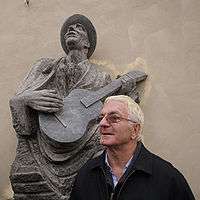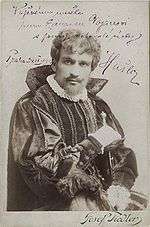Karel Hašler
| Karel Hašler | |
|---|---|
|
Karel Hašler in one of his roles at the National Theatre, Prague, around 1904. | |
| Born |
31 October 1879 Prague, Kingdom of Bohemia |
| Died |
22 December 1941 (aged 62) Mauthausen, Nazi Germany |
| Occupation |
Actor songwriter Film director writer dramatist screenwriter |
Karel Hašler (31 October 1879 in Prague – 22 December 1941 in Mauthausen) was a Czech songwriter, actor, lyricist, film and theatre director, composer, writer, dramatist, screenwriter and cabaretier. He was murdered in the Mauthausen concentration camp.[1]
Biography
Hašler studied to be a glove-maker, but he became intererested in theatre at a young age and occasionally performed with amateur theatre ensembles. In 1897, following his debut at the Aréna Theatre he left home and successively joined various travelling theatre companies.[2] In 1902 he became a member of the Slovenian theatre in Ljubljana, but soon moved back to Prague, where he joined the National Theatre ensemble.[2] In the National Theatre, he asserted himself in conversational plays. In addition to that, he also attempted to apply his singing abilities. Around 1908, he started composing his own music, and at the same time he began to incline to cabaret activities.[2] Gradually he became a director and head of various Prague cabarets, such as Lucerna (1910–1915, 1918–1923), Rokoko (1915–1918) and Karlín Variety Theatre (1924–1929). In 1908, he married a sister of pianist and composer Rudolf Friml.[3][4]
During World War I he also began to appear in silent films, as an actor, director and author. In 1914, he made a comedy České hrady a zámky (Czech Castles), based on his own script. The film was intended as an introduction for the play Pán bez kvartýru (A Man Without Flat).[2] He appeared also in the comedy Ahasver and in other silent films.
|
"If our songs perish, We'd lose all we cherish; Living would then be in vain." |
| Ta naše písnička česká, end of the third stanza, English translation published in Chicago, 1934.[5] |
Among his most successful film roles were the lawyer and deputy Uher in the drama film Batalion (The Battalion, 1927) by Přemysl Pražský, and the organist in Varhaník u sv. Víta (Organist at St. Vitus Cathedral, 1929) by Martin Frič. The coming era of the sound film in 1930s enabled Hašler to utilize his singing skills. In his first sound film role Písničkář (Balladeer, 1932) by Svatopluk Innemann he sang patriotic songs Svoboda (Freedom) and Ta naše písnička česká (Our Czech song), among others.[6] In 1942, in his last film role, he played himself in Za tichých nocí (In the Quiet Nights), made by his son Gina Hašler. From 1932 to 1941 Hašler played in more than 13 films. In September 1941, during production of the film Městečko na dlani, based on the script by Jan Drda, he was arrested by the Gestapo and sent to the Mauthausen concentration camp. The main reason for his arrest was his patriotic songs.[7][8] In Mauthausen he was tortured to death.[6][9]
In the post-war Communist Czechoslovakia he was officially ignored for political reasons, because many of his songs hailed Tomáš Masaryk and Czechoslovak Legionnaires, and mocked interbellum communists.[10]
Remembrance

Prague, 30 October 2009

A popular Czech herbal-menthol hard candy was called Hašlerka after him.[1][11] They have been known since early 1900s. Now the trademark is owned by Nestle.[12]
"Hašlerky" is a recognizable type of songs, written by Hašler and of similar character.
Czech astronomer Lenka Kotková (née L. Sarounová) named asteroid 37939 Hašler after him.[13]
In 2008, Czech directors Marek Jícha and Josef Lustig made a documentary Písničkář, který nezemřel (The Immortal Balladeer of Prague) describing the fate of Hašler's illegitimate son Thomas Hasler.[14]
On the occasion of Hašler's 130th anniversary (2009) a monument by sculptor Stanislav Hanzík was unveiled at the Old Castle Steps.[15][16]
In 2013 the band Patrola Šlapeto recorded a CD and DVD with 23 Hašler's songs based on original recordings found in musical archives. While there have been plenty recordings of Hasler's songs, this was the first in 80 years recording of the original tunes.[17]
 |
"Hoši od Zborova"
Sample of instrumental "Hoši od Zborova" by Karel Hašler, dedicated to Czechoslovak Legion in World War I. |
| Problems playing this file? See media help. | |
Karel Hašlers artistic output consists mainly of songs. He created more than 300 compositions, many of which became popular "folk songs". With his engaged patriotic approach he helped to strengthen the national consciousness of Czech people during times of danger and oppression.[6] Following his death in the concentration camp, his songs became a symbol of national resistance.[9]
Works
Selected songs
- Hoši od Zborova
- Kampak na nás, bolševíci? (1919)
- Po starých zámeckých schodech
- Pětatřicátníci
- Ta naše písnička česká
- Čí je Praha? Naše!
- Já mám holku od Odkolků
- Strahováček
- Podskalák
Actor:
- Pantáta Bezoušek (The Old Man Bezousek, 1941) – Councillor Burdych
- Roztomilý člověk (A Charming Man, 1941) – Editor-in-chief
- Za tichých nocí (In the Still of the Night, 1941) – Karel Hašler
- Jarní písnička (Spring Song, 1937) – Chodec
- Vzdušné torpédo 48 (Air Torpedo 48, 1936) – Dr Marvan
- Ať žije nebožtík (Long Live with Dearly Departed, 1935) – Petr Kornel
- Jedenácté přikázání (The Eleventh Commandment, 1935) – The Police Captain
- Král ulice (King of the Street, 1935) – Martin Antoni/Martin
- Za ranních červánků (1934) – Josef Dobrovský
- Srdce za písničku (A Heart for a Song, 1933) – Hugo Strindberg
- Záhada modrého pokoje (Mystery of a Blue Room, 1933) – Count Hellford
- Jindra, hraběnka Ostrovínová (Jindra, the Countess Ostrovín, 1933) – Musician Jahoda
- Písničkář (Balladeer, 1932) – Pavel Hala
- Kennst du das kleine Haus am Michigansee? (Znáš onen malý domek u jezera?, 1930) – Kennedy
- Adjunkt Vrba (Adjunct Vrba, 1929) – Maran
- Varhaník u sv. Víta (Organist at St. Vitus Cathedral, 1929) – Organist
- Batalion (Battalion, 1927) – JUDr. František Uher
- Falešná kočička (The Little False Cat, 1926) – MUDr. Karel Verner
- Cikán Jura (Gypsy Jura, 1922)
- Ahasver (1915) – Painter's Husband Valentin
- České hrady a zámky (Czech Castles and Palaces, 1914) .... Karel Hašler
Writer:
- Babička (Grandmother, 1940)
- Hordubalové (1938)
- Švanda dudák (1937) – screenplay
- Irčin románek (Irca's Romance, 1936) – screenplay
- Vojnarka (1936) – screenplay
- Vzdušné torpédo 48 (Air Torpedo 48, 1936)
- Jánošík (1935)
- Král ulice (King of Street, 1935) – screenplay
- Za ranních červánků (1934) – screenplay
- Záhada modrého pokoje (1933) – screenplay
- V tom domečku pod Emauzy (In the Little House Below Emausy, 1933)
- Písničkář (Balladeer, 1932) (screenplay)
- České hrady a zámky (Czech Castles and Palaces, 1914) – story
Composer:
- Venoušek a Stázička (1939)
- Neporažená armáda (Undefeated Army, 1938)
- Jana (1935)
- Jedenácté přikázání (The Eleventh Commandment, 1935)
- Král ulice (1935)
- Poslední muž (1934)
- Srdce za písničku (A Heart for a Song, 1933)
- U snědeného krámu (The Ruined Shopkeeper, 1933)
- Záhada modrého pokoje (1933)
- Písničkář (1932)
Music Department:
- Rote Rosen – blaue Adria (1938) – composer: song "Rote Rosen – Blaue Adria", "O du mein alter Stephansturm ..."
- Jarní písnička (Spring Song, 1937) – composer: song "Ta naše krásná zem je jako pohádka"
- Divoch (Wild Girl, 1936) – composer: song "Pod oblohou modré Adrie"
- Za ranních červánků (1934) – composer: song "Ty šumavské hory"
- Matka Kráčmerka (Mother Kracmerka, 1934) – composer: song "Valčík"
- Jindra, hrabenka Ostrovínová (Jindra, the Countess Ostrovín, 1933) – composer: song "My nikdy svoji nebudem"
Director:
- Irčin románek (Irca's Romance, 1936)
- Srdce za písničku (A Heart for a Song, 1933)
- České hrady a zámky (Czech Castles and Palaces, 1914)
Soundtrack:
- Za tichých nocí (In the Still of the Night, 1941) – music: "Po starých zámeckých schodech"
Producer:
- Jánošík (1935)
Notes
- 1 2 Horáková, Pavla (8 October 2004). "Singer and songwriter Karel Hasler was born 125 years ago". Radio Prague. Retrieved 27 August 2009.
- 1 2 3 4 Fikejz (2006), p. 367
- ↑ Homolová, Marie (31 October 2009). "Karel Hašler? Největší český hitmaker". iDnes.cz. Retrieved 2 November 2009. (Jednou tak zabrousil do hospody, kde se potkal s Rudolfem Frimlem, a byla to chvíle osudová, nejen proto, že se oženil s Frimlovou sestrou Zdenou.) (Czech)
- ↑ Deyl (2007), p. 202
- ↑ Levy, Alan. "Tom Hasler: Prodigal son's odyssey". The Prague Post. Retrieved 8 November 2014.
- 1 2 3 Fikejz (2006), p. 368
- ↑ "Scény z prezidentské kuchyně" uvidí v Hradci Králové" (in Czech). Czech Radio – Hradec Králové. Retrieved 30 August 2009.
- ↑ Deyl (2007), p. 300–303
- 1 2 Vičar, Jan. "Music Against the War". Palacký University, Olomouc. Retrieved 28 August 2009.
- ↑ "From Good King Wenceslas to the Good Soldier Švejk: A Dictionary of Czech Popular Culture", p. 54
- ↑ "Karel Hašler is Alive Again!". CzechMateDiary – blog. Retrieved 28 August 2009.
- ↑ "New exhibition charts development of Czech trade from Haslerky to Tesco"
- ↑ "JPL Small-Body Database Browser". NASA. Retrieved 28 April 2008.
- ↑ "The Immortal Balladeer of Prague". Karlovy Vary International Film Festival. Retrieved 28 August 2009.
- ↑ Při odhalování pomníku Hašlerovi davy lidí ucpaly zámecké schody – České noviny, 31. 10. 2009
- ↑ Praha oslavila 130. výročí Karla Hašlera odhalením pomníku – ČT24, 31. 10. 2009
- ↑ "Patrola Šlapeto nahrála zapomenuté Hašlerovy šlágry"
References
External links
| Wikimedia Commons has media related to Karel Hašler. |
| Wikisource has original text related to this article: |
- Karel Hašler at the Internet Movie Database
- Karel Hašler and Jaromír Vejvoda – Commenius Project
- Czech Radio – Magazine (2004)
- The Immortal Balladeer of Prague – Fangango.com
